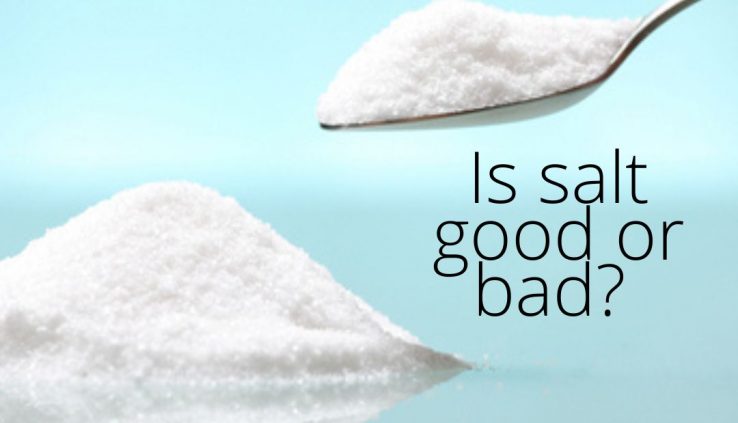SALT :
Upon ingestion of a given substance, the body either uses it as nutrition or rejects it as poison. The body recognizes salt as poison and takes action by diluting bodily fluids so that the salt occurs in less damaging, less irritating, less caustic concentrations.
Sodium, NOT salt, is a required element, but you want the sodium that is found in fruits and vegetables like celery, tomatoes and cucumbers.
One ounce of ingested salt holds 3 quarts of water (6 pounds of excess bodily fluids) in suspension. It is extremely dehydrating and toxic to the body.
Sprinkle salt into an open wound and you will experience how the body itself reacts internally when salt is taken in food. The only difference is that the nerve endings are less numerous and less exposed in the digestive tract, so the burning sensation is only vaguely experienced.
When the body takes in huge amounts of salt as is typical in the salty, standard American diet, the sodium accumulates in the interstitial fluid (that surrounds the cells) creating a disruption in the fluid balance. There is more pressure in the interstitial fluid holding the salt than normal.
The body is self-regulating, always working to maintain balance. So, the surrounding capillaries and cells release water to dilute the salty (intracellular) fluid inside the cells. The spaces around the cells then swell while the cells and capillaries dehydrate and constrict.
This dehydration results in extreme stress to the cells and capillary tissues, which prematurely ages them.
As the (interstitial) spaces around the cells and the blood volume of the capillaries, as well as the capillary tissues themselves dehydrate in order to dilute the intracellular fluid (inside the cells), the salt eater experiences an overpowering sense of thirst.
As you satisfy this thirst by drinking large amounts of water, your body shifts to a pathological mode of functioning. First, interstitial fluid volume increases, then blood volume increases and cellular volume increases.
Your body’s estimated 100 trillion cells and the spaces between them ultimately swell. This means that your heart is forced to exert more force to pump the blood. The cardiovascular system ages prematurely, along with every cell in the body.
A healthy body would respond to salt eating with vomiting and/or diarrhea to get rid of it immediately. In an unhealthy, enervated body, there is not sufficient nerve energy to eliminate the salt.
The weakened body retains the salt and defends against this irritant by accumulating excess quantities of water to dilute the retained sodium. This puts additional fluid pressure on the delicate tissues of the human body.
Do you crave salt?
The adrenal glands are your mineral utilization glands. When the adrenal cortex (where steroid production takes place in the adrenals) is compromised, this often results in decreased output of mineralocorticoid steroids and thereby loss of sufficient sodium (among other minerals) utilization, leading to salt cravings.
As you respond to these cravings by increasing your salt intake, you can feel much better and falsely believe that the salt is strengthening or rebuilding your adrenals, when in reality the salt is only serving as a form of temporary stimulation.
You can strengthen the adrenals through diet, necessary lifestyle changes, therapeutic practices, and other tools which include herbs and/or glandulars. Once adrenal performance is increased, your salt cravings will subside.
Salt is very, very dehydrating, an adrenal stimulant, toxin, and inorganic mineral. Go without it for a few months and then ingest and watch how you get bloated and feel toxic.
Get your mineral salts, including sodium, from the plants. Celery is a great source. You can also use kelp and other seaweeds for a salty taste. They have organic salts, the ones your body can actually use.
It is natural sodium we need, NOT salt, and we should get it from fruits and vegetables. No isolates.

